
Julian Assange: for and against
Peter Hitchens must have thought he was looking at a stranger in the mirror as he shaved yesterday morning. For there, staring back at him, was a “liberal”, a “left-wing hack” or possibly even a “luvvie”. Talk about a shock to the system.
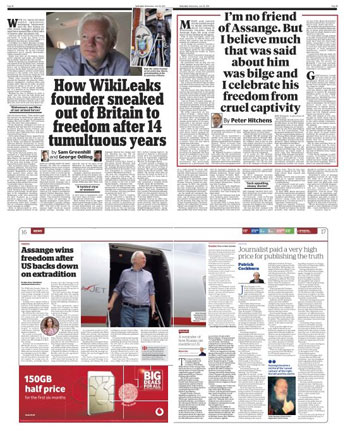
How did this transformation from rightwing polemicist come about? Through his support for Julian Assange, who has finally been released after years of fighting extradition to the US over his Wikileaks disclosures. For Hitchens, writing in the Mail, this was the end of a saga that had shamed both Britain and America. For the Sun, it was a travesty of justice whose only upside was the fact that we were finally shot of this egomaniac feted by aforesaid liberals, luvvies and left-wing hacks.
For the Sun and its Times stablemate, Assange’s publication of thousands of classified documents relating to the wars in Iraq and Afghanistan and the fights against al-Qaeda and Isis, was reckless and probably cost countless lives.
But Hitchens asserts that far from being reckless, there is strong evidence that Assange had been very careful and strove to redact potentially dangerous material. He says there is no evidence to support repeated claims that American public servants had been endangered, while Patrick Cockburn in the i goes further, reminding readers that a Pentagon task force set up a decade ago failed to find a single person who had died or been harmed by the Wikileaks disclosures.
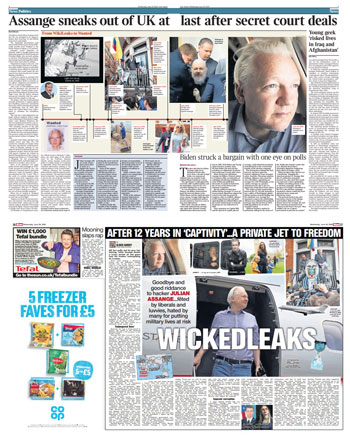
Yes, but it’s not just about American lives, the Sun and Times could counter. What about the identification of more than a hundred Afghans who had provided intelligence on the Taliban to the West, many of whom now lay dead?
The two sides are also at odds on the rape allegations from Sweden. Three times, Cockburn writes, the Swedish government sought Assange’s extradition and three times it retreated, never actually bringing charges. While the Times leader points to the fact that he skipped bail – betraying supporters who had posted thousands of pounds on his behalf – to hole up in the Ecuadorean embassy, and that the two women who made the complaints of sexual assault were subjected to a “barrage of misogynistic insinuations and abuse”.
Where everyone agrees is that Assange is not a very pleasant person. But that, as both Hitchens and Cockburn are at pains to emphasise, is beside the point. The real issue here is freedom of speech and freedom of the press. It is a journalist’s job to get information and to publish that information where it is in the public interest. Even the Times accepts that footage of American airstrikes that killed civilians, including Reuters journalists fell into that category. It argues, however, that that was the exception among the mountain of material, while the Sun maintains that Assange is not a “proper” journalist.
Time was that a “journalist” wrote for a recognised journal, but that is clearly not the case these days. You could disappear down a rabbit hole for a century before you came up with a definition that would suit everyone today. The Murdoch papers may wish that the term could still apply only to those employed by recognised outlets in the mainstream media, but in doing so, they are blinkering themselves to the importance of the Assange case to their own interests.
For this is what Hitchens and Cockburn recognise: that for all his character flaws and whether he was a “real journalist” or not, Assange was doing what all journalists are supposed to do. And to criminalise that is to criminalise the activities of others who might be regarded by the Times and Sun as more legitimate pliers of our trade.
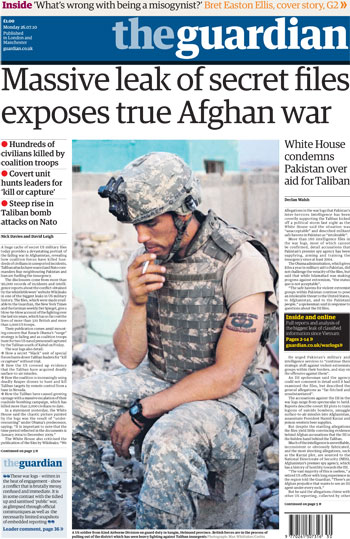
The Guardian – which published some of the Wikileaks material, in common with the New York Times, Le Monde, Der Spiegel and El Pais, in July 2010 – points to the dangerous precedent of Assange having been charged under America’s 1917 Espionage Act. The fact that 17 of the 18 charges against him were dropped, so that he was left, under the deal struck this week, to plead guilty to a single count of conspiring to obtain and disclose US national defence documents, does not lift that threat to the free press. It made him the first journalist to be convicted under that law and leaves anyone from any publication open to prosecution for spying.
The Times may have had no sympathy for Assange or the fact that he had spent 1,901 days in Belmarsh, a jail used for the most dangerous criminals and terrorists. But surely it should be concerned about the precedent of this espionage conviction? I ask because the paper carries a photograph of News Corp journalist Evan Gershkovich on page 2 every day, with the hashtag #FreeEvan, and a tally of how many days he has been held in detention in Russia, accused of espionage. Yesterday the count reached 455.

Today he is promoted to the front page, plus a central slot on the opening foreign spread inside. For Gershkovich, who works for the Wall Street Journal, finally appeared in court yesterday. He was seen and photographed in the dock before the courtroom doors were closed to the public. This “show trial” will be held in secret, so the next time we’ll hear about him will be after his almost-certain conviction. Then the prisoner swap negotiations will likely begin.
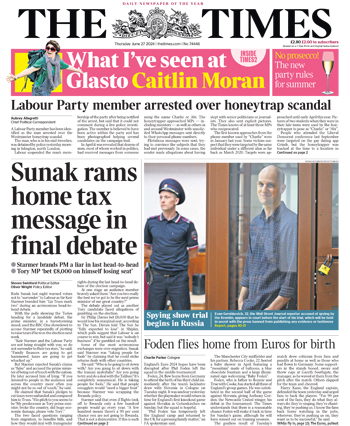
Gershkovich was not dealing with classified documents. He was arrested on what his employers insist was an ordinary reporting assignment in Ykaterinburg. The only similarity he has with Assange is that he is a man who was accused of spying while trying to bring information to public attention.
But it feels uncomfortable that a paper like the Times should condone such treatment by the American and, by extension, British governments on the very day that it became painfully clear where the use of such legislation against journalists can lead.
Journalistic ethics
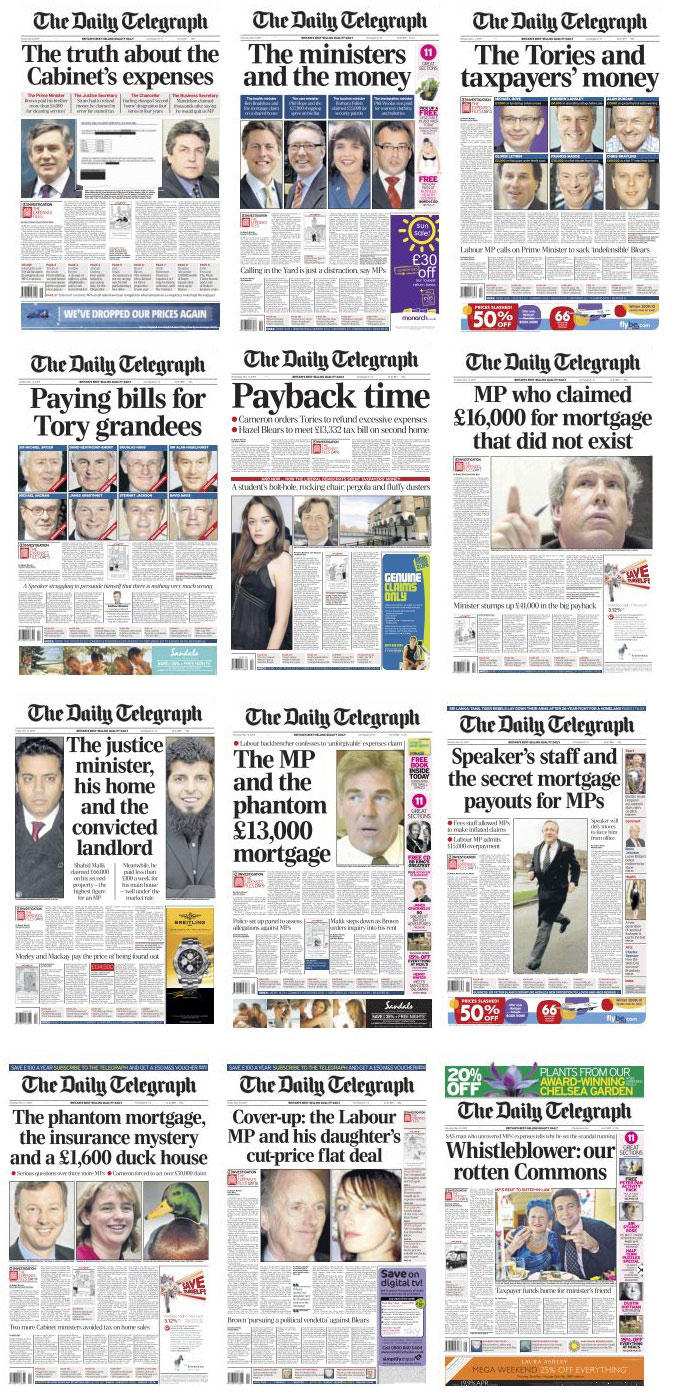
I found it quite sweet that the Times leader should make the point that the documents published by Assange had been “stolen”. They were handed to him by Chelsea Manning, a former US soldier and military analyst who was convicted by court martial in 2013 of, among other things, espionage and theft, and sentenced to 35 years. She was released in 2017 after her sentence was commuted by the outgoing President Obama. Of course, all whistleblowers “steal” documents. Yet investigative journalists are still happy to receive and publish them. Well, most investigative journalists.
In 2009, the Times was as righteous about the provenance of explosive documents as it was yesterday. Editor James Harding declined the offer of tapes revealing what MPs had been charging to expenses. Because they had been stolen. The Telegraph judged that public interest trumped the ethics of handling stolen goods, published and was not damned but exalted.
Harding’s high-minded judgment is widely held eventually to have cost him his job; Will Lewis, the editor who oversaw the Telegraph operation, was named journalist of the year (the Telegraph was newspaper of the year), and within two years had been recruited as group general manager of News International. He went on to become chief executive of the Murdoch-owned Dow Jones and publisher of the Wall Street Journal. Two years ago, he was knighted in Boris Johnson’s resignation honours.
He is now chief executive of the Washington Post. But, six months into the job, his apparently glittering career has lost its sparkle. Because he is facing a workers’ revolt, a revolt that has caused the Telegraph’s current deputy editor Rob Winnett – the man who wrote many of the MPs’ expenses stories – to decline to cross the Atlantic to take the editor’s chair.
It seems the Americans were also concerned about the ethics of the expenses scoop – not so much that the tapes were stolen, but that the Telegraph paid for them. They have also alleged that Winnett used “stolen” material (from self-confessed blagger John Ford) when at the Sunday Times. Lewis is meanwhile accused of attempting to suppress coverage of Prince Harry’s lawsuits against News Group over here, and of agreeing to an interview only on the condition that there should be no questions about phone hacking. The interview did not go ahead.
Why should Lewis not want to talk about the hacking scandal? Perhaps because he is widely remembered on this side of Atlantic for his role in News International’s “draining the swamp” operation that handed police masses of material that led to the (failed) prosecution of many journalists. Now that he is an influential figure on the other side of the pond, there is renewed interest in his part in the investigation. On Monday, the New York Times carried a lengthy report headlined “Washington Post publisher says he aided hack inquiry. Scotland Yard had doubts”. It says the NYT has obtained confidential documents that show that, almost from the beginning, investigators were suspicious of the company’s intentions and came to view Lewis as an impediment.
According to the NYT, one senior detective noted in an internal summary that there was a suspicion that the company was trying to “steer the investigation into a very narrow remit” by pointing the finger at a few journalists “while steering the investigation away from other journalists and editors”.
Which is not exactly news to media watchers over here.
The Times, the Telegraph, News International, the Washington Post, the Wall Street Journal – what an incestuous little world we inhabit. Oh yes, and Lewis’s successor as Telegraph editor? The man now occupying the Times chair, Tony Gallagher.
Kate's return: a lesson for lesser mortals?
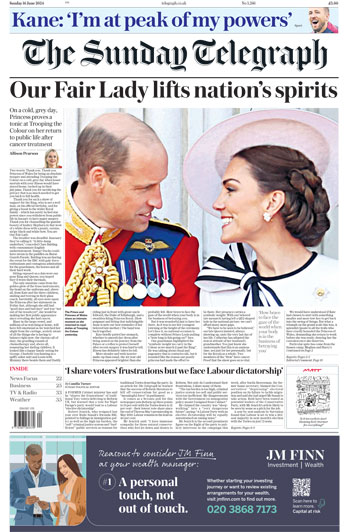
Everyone was pleased to see the Princess of Wales back on duty for Trooping the Colour. The gushing sycophancy was to be expected – though not excruciating puns like “Kate to see you” – but there are limits. And Allison Pearson of the Telegraph burst through those limits with all the dignity and elegance of Boris Johnson driving that “Get Brexit done” JCB through that polystyrene wall.
In a splash colour piece for the Sunday paper, headlined “Our fair lady lifts nation’s spirits”, she fawned: “Thank you. Thank you, Princess of Wales for being an absolute trouper and attending Trooping the Colour on a cold, grey day when lesser mortals with your illness would have stayed home, tucked up in their jim-jams.”
She kept this up for 1,200 words, talking about the weather, about Catherine being a ray of sunshine on gloomy day, hypothesising on what the family was feeling, congratulating the princess on her stoicism, her bravery, when all she probably wanted was a nice cup of tea.
Was she presuming to speak for the nation? Or just competing with Sarah Vine of the Mail, who had her own box of hyperbole? At least Vine was merely cloying, while Pearson managed to lose this race in the very first paragraph by dint of offending virtually every other cancer sufferer in the country.
Lesser mortals? Staying at home, tucked up in their jim-jams? Has she any idea, even the first notion, of how most people deal with their variants of the disease? Has she any thought for those who keep going to work, day in, day out, taking time off only for the chemo sessions? She must have encountered such people. I certainly did in my working days in my very office. And those for whom the pain is intolerable? They are lesser mortals for resting when they need to?
Much praise was heaped on the King when he announced his own diagnosis. This, everyone said, would act as encouragement for people who suspected something wasn’t quite right to get checked out. There was even more sympathy for the much younger Princess when she made her park bench announcement just before the school Easter holiday. These public statements would raise awareness, help fellow sufferers.
But that was back then. Now the ordinary people – the lesser mortals – have been put back in their place. In jim-jams rather than an Audrey Hepburn hat.
Election coverage
Will the Sun back Starmer?
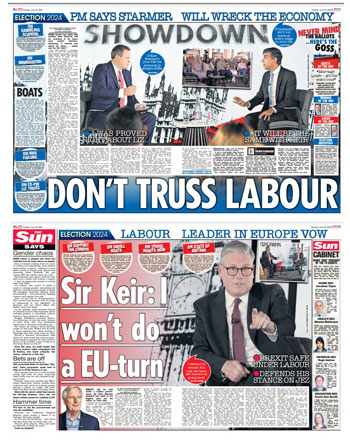
What else has been going on? Oh yes, there’s an election campaign. Best not to dwell on it for too long, since most newspapers are carrying on true to form. But here are a few random thoughts.
The Sun was strongly rumoured last week to be about to endorse Starmer. That would be quite the leap for a paper that has been so rude about him for so long. But we all know that Murdoch likes to back the winning team, so it’ll be interesting in this last week to see if – and how - Victoria Newton manages to square the circle.
She has started by having political editor Harry Cole host a leaders’ debate at the Baby Shard, reporting on the event in a pair of spreads in red and blue livery. It was pretty even-handed – to the extent that no one was much impressed by either of our putative prime ministers. The paper also published a leader, with which many will have sympathy, last Friday highlighting the many issues that (it says) no politician is talking about – the state of our roads, railways, public services, the NHS, the criminal justice system. The Sun was going to put that right with a four-part series on these issues. Great stuff! Why didn’t you do that weeks ago?
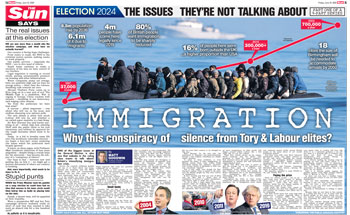
First up? Immigration. Because absolutely no one has been talking about immigration at all at any point during this campaign. There’s a chap standing in Clacton who will talk about anything but. Still, a rational analysis would be welcome. Step forward Professor Matthew Goodwin, a man so well-known and respected for his non-partisan, see-all-sides-of-the-picture approach.
Next on parade was Leo McKinstry examining why nothing seemed to work any more. Answer: Because of strikes, jobsworth administrators and wastefulness. Nothing to do with central government.
And then? Who knows? The leader didn’t tell us what the four parts of this series would be looking at. There have been no “Next” trailers for the coming part and, with a week to go to polling day, no sign of episode three. I write this on Wednesday, so it may be in this morning’s paper. Or not.
i plays it straight

Even if the Sun does endorse Starmer, we can be pretty sure that it will not be claiming “It’s the Sun wot won it” on July 5. Not least because the newlywed big boss told the Leveson inquiry that he’d never liked the headline; too crowing. Still, it sits in folklore and it was rather nice to see a different take on it as the i presented its rather impressive line-up of reporters and commentators yesterday.
Will the readers listen?

Murdoch may not like crowing, but we know the Mail can’t help itself. Yesterday its splash headline was “Mail readers were RIGHT…” over an “exclusive” interview with Keir Starmer (complete with reassurance for anyone reaching for the smelling salts that “Our political editor puts him through the wringer…”)
Of course, Starmer was never going to come out of this the winner – the paper’s verdict remains as it has been from the word go: “Can we really believe he’s changed?” As to the “exclusive” tag. Well, of course it was. In that Jason Groves was the only one interviewing the Labour leader that moment. Several others have been there before and several more will doubtless follow.
Rather like Monday’s “exclusive” on Rishi’s ten days to save Britain. Which came the day after the Sun’s exclusive on Rishi’s 11 days to save Britain (an interview conducted by Kate Ferguson, partner of the Tory party chairman. Sympathetic? You might say).
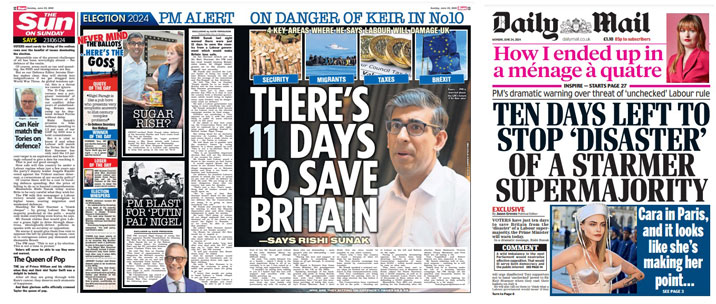
We can be pretty certain that the Mail will urge readers to stick with Sunak next Thursday. But it looks as though more than half of them will reject such advice. A very interesting survey by Redfield and Wilton on voting intentions, broken down by the respondents’ primary news source, found that only 26% of people who look first to the Mail for their information intended to vote Conservative. About a fifth were going to back Reform and 40% Labour.
The figures were equally disappointing for the other rightwing titles. The breakdown for the Sun was 45% Labour, 23% Conservative, 17% Reform; for the Telegraph 37%, 23% and 19% and for the Express 43% Labour, 28% Conservative and 15% Reform.
Express continues to listen to Rishi (and Farage)

Which makes you wonder why the Express perseveres with all those “Rishi says” headlines. Both it and the Telegraph have been making a habit of listening to “what Labour will do” coming out of the mouths of Tory ministers rather than from Labour figures – though, to be fair, Labour hasn’t said much about what it is planning. But the Express has been in overdrive this past fortnight with six of the last 12 splashes being Labour scare stories, three of them starting “PM:” or “Rishi:”
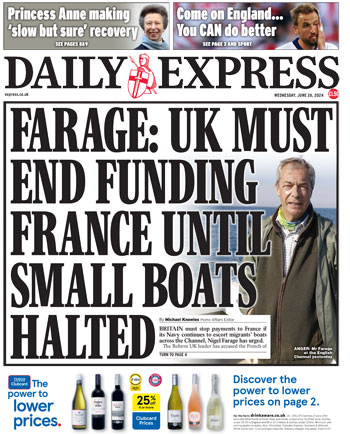
Yesterday, however, was like a trip down memory lane back to 2015-16 and the Whittow Express with its flirtation with UKIP. With foreshortened puffs, it gave virtually the whole page to “Farage: UK must end funding France until small boats halted”. There was also a spread inside on the man holding forth on a boat. Will you tell them or shall I? He may make a lot of noise, but Mr F will not be in a position to do anything about “funding France” before or after the small boats are halted.
Ever since he made his grand entrance, the Tories and their press supporters have been frantically telling anyone who will listen not to vote Reform, that to do so would give Labour a “supermajority” (which is pretty meaningless, because, as we saw with Johnson, 80 will do. Another 100 or 200 seats wouldn’t make passing legislation, palatable to the opposition or not, any quicker or easier). Yet they keep giving its leader the oxygen of publicity. If they ignored him, he wouldn’t go away, but nor would he grow in apparent stature or authority.
Gender wars

If that Redfield and Wilton survey suggested a worrying divergence between the Tory press and their readers on who to vote for, there seems to be an even wider gulf when it comes to what issues matter to voters. The latest Ipsos-Mori “issues index” has four clear leaders – the NHS being mentioned by 41% of respondents, the economy by 33%, immigration by 30% and inflation / prices by 29%.
Amazingly, the top ten – the last of which, law and order, was cited by just 10% – does not feature gender or culture wars. Yet this subject continues to be given huge prominence by the rightwingers. The latest eruption came courtesy of the spat between Kemi Badenoch and David Tennant which, it has to be conceded, was a bit like a poor man’s Diane Abbott-Frank Hester row, with a white man telling a black woman to shut up. That made spreads all over the place.
Before that, we had JK Rowling telling the Times she couldn’t vote Labour because of its attitude to women. Well, that’s fine for her. But Joanne is no more the national arbiter on the treatment of women and how we should vote than Esther is on assisted dying. Her views are interesting, possibly of merit, but not, in the grand scheme of things, that important. But the Times is obsessed. For three consecutive days this past week, it has splashed on gender issues. First JK Rowling’s words of wisdom, then Labour allowing people to change gender “on less evidence” and then the party banning conversion therapy.
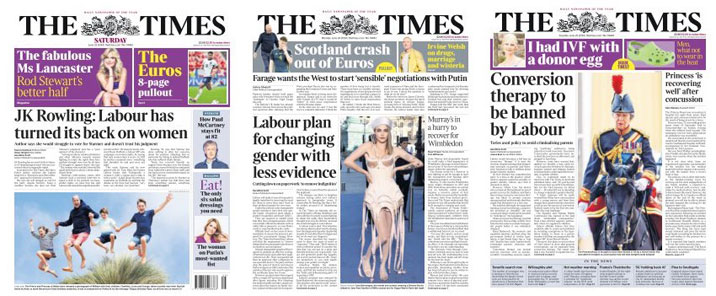
Meanwhile the Telegraph has led on Labour ripping up trans rules for schools and carried a front-page story on Wes Streeting admitting that his party’s stance on gender issues has damaged its standing with women.
I repeat, this is not the issue on which people will cast their vote. You can argue until you’re blue in the face that this is about “women”, who make up more than half our population, not about the tiny number of trans people in our society. But the facts are still the same. Most people really don’t care.
The Truss factor
As we have seen, the Mail likes to make itself the centre of attention where possible. But it seemed to have forgotten one of its key roles in our political history when it published Dominic Lawson’s oped last week.
“Starmer backed Corbyn, while Sunak warned against Truss,” ran the headline. “It’s clear which man puts country before party”.
Yes, Sunak warned against Truss – as he has been reminding anyone who will listen this past week. And did the Mail heed those warnings? No. It did everything it could to undermine him, as a Machiavellian back-stabbing Brutus, while promoting her as the nation’s saviour. You’ll have read all about it here and in this book. But here’s a reminder of some of the headlines from the time.
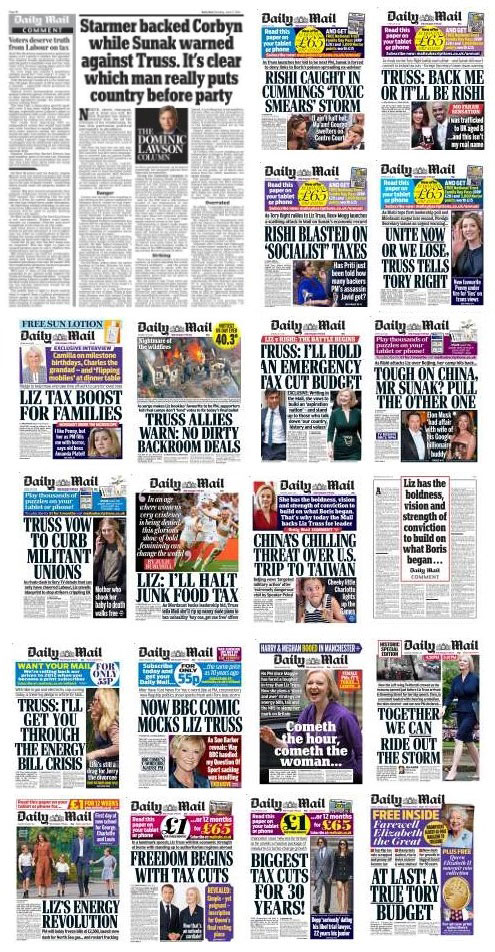
(Incidentally, I’m not alone in remembering this period of the Mail’s history. Former editor Geordie Greig, now in charge of the Independent, gave his old paper both barrels in delivering the Hugh Cudlipp lecture last night, saying that, far from helping the Conservatives, its extreme partisanship may have been partly to blame for the Tories’ expected implosion. It was a fantastic speech – if a little long on self-applause – which included a reference to the infamous “Enemies of the people” splash, describing the Mail and Telegraph as, perhaps, “enemies of accurate, prescient journalism”. Please do have a read.)
Class war?
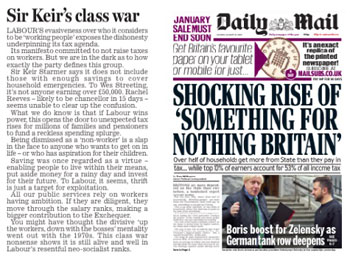
And then there was this apparent change of heart last Thursday when its leader, under the headline “Keir’s class war”, asserted that Labour’s evasiveness over who it considered to be working people exposed the “dishonesty underpinning its tax agenda”. It continued: “Being dismissed as a non-worker is a slap in the face for anyone who wants to get on in life or has aspiration for their children.”
This was presumably a plea on behalf of savers and people living on investment income, who, it fears, will be penalised under the next government. But that sentence comes oddly from the paper that was last year bemoaning that half the population didn’t go to work and contribute to the economy, the paper that vilifies those who fit its – rather than its interpretation of Labour’s – definition of “non worker”.
Private vs State
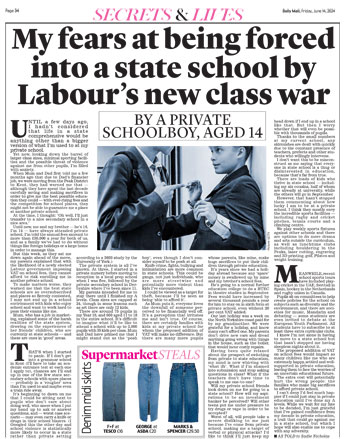
I shall complete this hat-trick of Mail moans with more “Labour class war”: an article, purportedly written by a 14-year-old private schoolboy who fears life in a bog-standard comprehensive. It is the most nauseating thing I’ve read in a long while.
This lad wrote that his family had to move from the Peak District to Kent because of his dad’s work as a financier. “Until now, me and my brother – he’s 16, I’m 14 – have always attended private school…” (a private school that clearly doesn’t teach grammar). The fees came to £30,000 a year and his parents had made “huge sacrifices” to be able to afford them; going without things like foreign holidays and a large home (are we getting the Sunak “no Sky TV” vibe here?).
There was a chance when they moved south that they might not be able to continue with private education because of the competition for places and ever-rising fees – ah well, never mind, we’ll go to “a nice secondary school in a nice area”. But now, with Labour threatening VAT on fees, his parents had decided they couldn’t risk even trying to enrol their sons in a private school.
“To make matters worse, they warned me that the best state schools are so oversubscribed and places so fiercely contested, I may not end up in a school environment with kids who enjoy school and want to work hard to pass their exams like me.”
He continues: “Knife crime, fights, bullying and intimidation are more common in state schools. This could be gangs, not just individuals, who are more streetwise and potentially more violent than kids I've encountered. I could be viewed as a target for theft, because I'll be seen as being 'able to afford it'.”
So, he’s panicking and he’s going to try to get into a grammar school, which will involve taking entrance exams.
Assuming this child is genuine, he probably is nervous and full of trepidation. But the writing style does not seem to be that of a 14-year-old. How many Year Nines talk about “Labour’s class war” or use phrases like “oversubscribed” and “fiercely contested”. Still, maybe he just talked his thoughts through with someone able to help him with the Mail vocabulary.
But setting aside the obvious “what about the millions of kids who don’t have your advantages?”, what parents would think it a good idea to put the fear of God into their son in an attempt to warn him of the “harsh realities” of what life in a state school is like? Who thought it a good idea to commission such a piece? To make a child the mouthpiece to make a political point?
Someone willing to pull any lever if it stops the Labour train.
Election date flutters
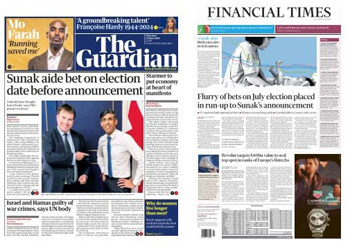
This column can’t be all brickbats. How about the odd bouquet? Well, here are a couple for the Guardian for breaking the Tory election date betting story and for the FT for the exhaustive follow-up that began to reveal the extent of the scandal. Hats off, too, to the Telegraph for not being too shy about showing its favoured party in uncomfortable light, first by putting Craig Williams on the front on day one, and later with its Alister Jack £2,000 winnings splash (whether he was joking or not).
After the initial “Can’t they get anything right?” reaction, I found a story in Saturday’s Sun possibly the most intriguing on the subject. It concerned a punter from Chelmsford who blamed insider cheats for his losing more than £2,000. This chap had spotted the May 20 spike in bets on the election being held on July 4 and felt it didn’t look right. Rather than think “someone must know something” and follow the crowd, which – using the subsequent FT data – could have turned his £2,250 stake into £18,000, he “immediately decided to match the bets” and gamble against those betting that the election would be on that day. In the hope of winning just £500.

It was, he explained, a “good bet”, a cert like backing Manchester City to beat Southend United. So it was all the fault of the “cheats” that he was out of pocket. Even though there was no compulsion on him to gamble. Why anyone would see a surge of bets in one direction and feel the urge to gamble such a sum on the exact opposite at such unfavourable odds is beyond me. People who understand these things say it makes perfect sense, that that’s exactly how betting exchange works. But the real takeaway from this story was that the spike was there, clear as day, for anyone with the eyes to see it.
Binface picks up Star endorsement
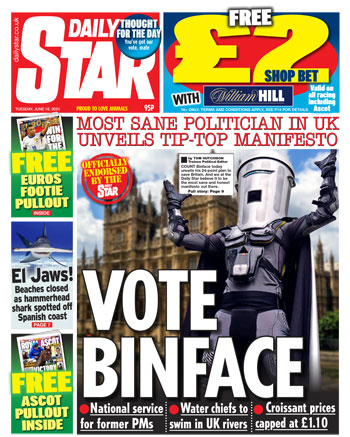
While we’re waiting for the Sun to make up its mind, we’ve had one terrific endorsement so far. Who doesn’t love the Daily Star?
The Euros – WAG watching

Oh, by the way, there’s a football competition going on at the moment. England topped their group, but have bored most spectators rigid (congratulations to the Star this morning for tracking down the snoozing fan who was on every front page yesterday). We’ve had the obligatory pictures of Harry and the obligatory “Kane the Danes” puns (we didn’t). And, of course, lots of pops at Gary Lineker.
But when the actual footie fails, there are always the WAGS. And guess who’s stealing the limelight? As promised, Kyle Walker’s wife, lover and assorted children are all there to cheer him on. And guess which paper is the most interested? The Sun, with its long and illustrious history of Walker splashes? Well, obviously, it’s been avidly following every twist and turn of this soap opera.
But which paper put it on the front? Step up the football-hating Mail, which entered the race with an above-the-titlepiece puff on its exclusive interview: “Why I took Kyle Walker’s son to watch him play at the Euros – by the ex-lover at war with his wife”. And a big spread inside. Don’t you love it!
Front page of the fortnight
There have again been some striking front pages from the Express, not least yesterday’s featuring Nigel Farage. The i also broke its mould with a cover on the Reform leader saying he couldn’t guarantee his party would keep its promises. But both are disqualified on the grounds of giving this man undue and unwonted publicity (who said this was a democracy. I set the rules!).
The award therefore goes to the Telegraph for an equally striking front page on the threat to the party it supports. I applaud it for the dramatic presentation of the two maps side by side and for having the guts to print such a negative story from the Tory point of view. Even it if was designed to bring waverers back into the fold.

Liz Gerard’s Notebook is a fortnightly column published in the InPubWeekly newsletter. To be added to the mailing list, enter your email address here.












